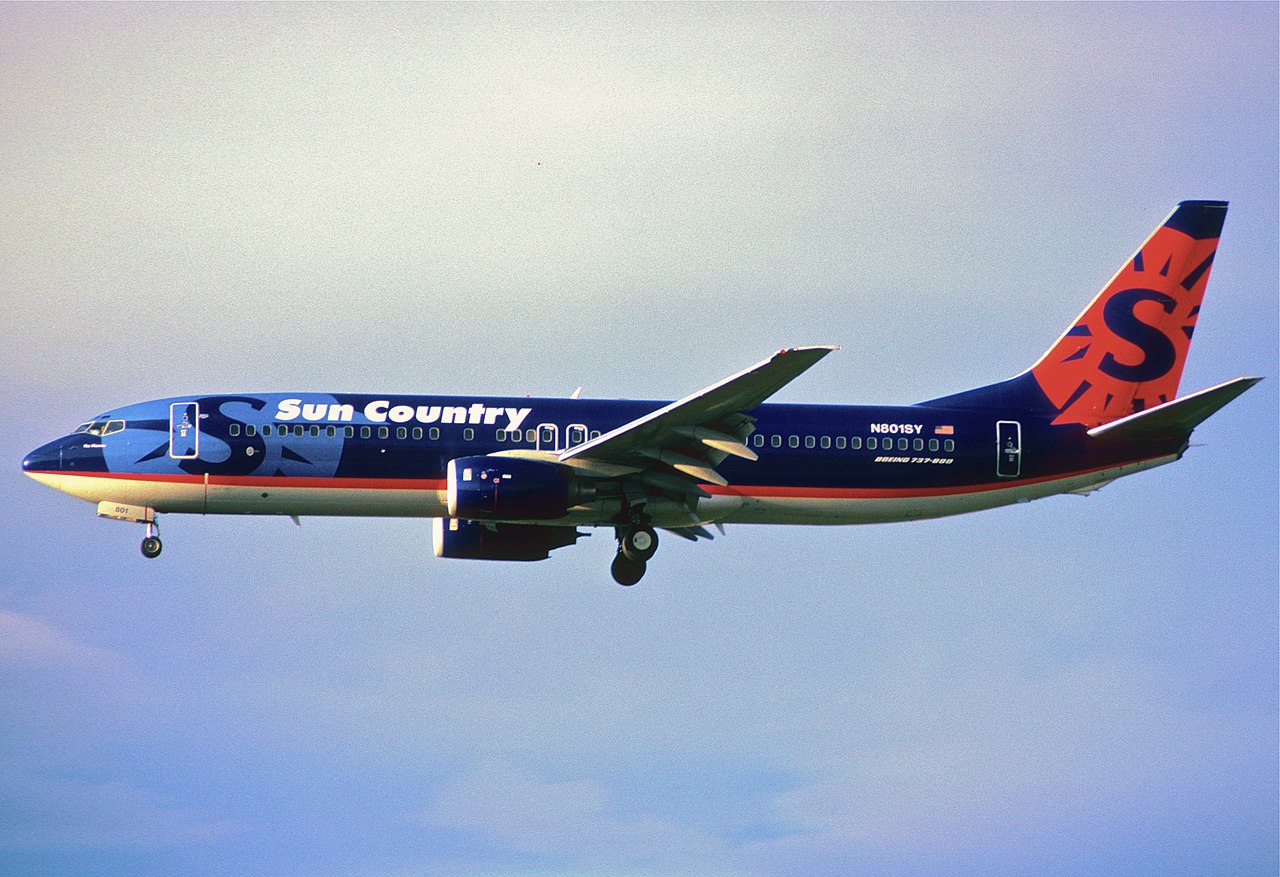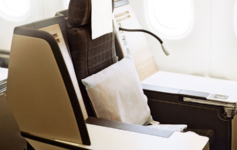I truly fell in love with Sun Country Airlines after my trip from Los Angeles to Minneapolis last year. But news out of Mexico illustrates why I predict this airline will not survive.
That sounds draconian, doesn’t it? Certainly the issue is more than one customer service mishap. But this issue vividly demonstrates the change in values at Sun Country, an airline that has survived on the basis of its “hometown” charm and now lost it. Here’s what happened:
Sun Country serves Mazatlan and Los Cabos, both destinations in Mexico, on a seasonal basis. Although the winter season has come to a close, a fierce storm hit Minneapolis last weekend. That led to several flight cancellations, including to these two resort destinations on the last day of service.
Because of Sun Country’s small fleet and aircraft utilization needs, the cancelled flights were not rescheduled. Since it was the end of the season, passengers were told they were on their own in finding a way home.
Many complained. Most could not even reach Sun Country. No staff were at airport counters in Mexico. Telephone lines were so jammed that most passengers received a pre-recorded “please call back later” message.
Sun County’s response? A short, vapid response.
Flights will need to be purchased on another carrier. We apologize for any inconvenience this may cause.
Pathethic…
Flawed Logic: We Can’t Help Because it Would Hurt Others
Sun Country claims it could not help the stranded passengers because re-allocating an aircraft would cause a ripple effect creating even more delays and cancellations.
Sun Country spokeswoman said:
As disruptive as the current situation is for the affected passengers, the alternative — canceling other flights to other destinations — would have been more disruptive to even more passengers.
And of course she is right.
BUT THAT WASN’T THE ONLY SOLUTION!
It’s not like Los Cabos is only served by Sun Country. In fact, it is served by all the majors in the USA and Mexico. It’s true that Sun Country has no interline baggage agreement with these carriers, but they could have bought tickets on any of these airlines just like the passengers ultimately had to do.
I find it morally reprehensible that an airline would just leave passengers behind. Imagine the senior citizens or families with children stuck at a resort in a foreign country, forced to find options to get home on their own, likely at a higher price with extra connections.
This story in the Star Tribune is rife with such stories.
CONCLUSION
Like Lucky, I believe this issue demonstrates why the USA needs consumer protections like EU261 in Europe.
Even for those who favor more limited government intrusion into the free market, ask yourself this: should a customer really be told to 1.) fight Sun Country in court and 2.) this is how the “markets work” when stranded without any viable options in Mexico?
If you wonder why I fight airlines over so-called mistake fares: this is why. It is absurd to me that an airline can cancel a flight virtually without penalty. Had the shoe been on the other foot, no passenger would have been offered the chance to cancel a non-refundable ticket because they felt like it.
> Read More: Can Sun Country Airlines Survive? I Doubt It.
> Read More: Sun Country First Class Los Angeles to Minneapolis
imge: Aero Icarus / Wikimedia Commons





I had a flight on Tiger Air several months ago on CNS-SYD with a flight back to the states the following morning that cancelled after we boarded due to a sick crew member. They offered no rebooking help other than to tell everyone to call for a refund and to find your own way. I ended up spending $800 on 2 tickets go SYD via BNE later that day which is substantially more than i had paid on Tiger Air.
Passengers certainly should have some protection from airlines being quick to throw in the towel instead of finding solutions
1. Should a customer be told to fight Sun Country in court?
Your question appears to be premised on the false conclusion that there exists a viable cause of action. You’re an attorney, so you know about the CoC, force majeure, etc. Unless one intends to fight the issue of whether the snow storm qualified as a force majeure, I fail to see what there is to litigate. What legal theory do you see as viable?
2. Should a customer be told “this is how markets work?”
No. He/she shouldn’t have to be “told” anything. He/she should know that they exercised their right to contract with a private entity for services, and that they all expressly indicated their understanding and acceptance of those terms. Two private parties knowingly made a deal. Deal went bad from an Act of God. How is it either party’s fault? On what authority are you assigning fault? Your subjective feelings?
I feel bad for those stuck, but they are not incapable morons. They are human beings who made an informed decision. They decided that the dirt cheap fare, direct flight, etc., outweighed the risks appertaining to flying a tiny ULCC on a seasonal route. They further decided that the $25 trip interruption insurance offered to them at checkout wasn’t worth it. Now that each decision turned out retrospectively to be bad, someone else needs to be punished or regulated?! How do you figure?
@Wes: I don’t believe airlines should hide behind CoCs, which are nothing more adhesion contracts. If an airline wants to operate in the United States, no matter how “no frills” it is, I believe they should be on the hook to provide a basic level of service that cannot be contracted away. That includes getting a passenger, whether on their own line or another airline to that passenger’s final destination. Under no circumstance should a passenger be left holding the bag, figuratively and literally.
In every contract there is an implied covenant of good faith and fair dealing. Sun Country fails that test.
I completely agree with Matthew (as an attorney).
I would also argue that the onward transportation provision in the COC – under which passage on another carrier is discretionary – is still subject to reasonableness, which this clearly violates (unlike, say, offering to put you on tomorrow’s flight). And I’d file complaints with the DOT and the BBB, and probably look into small claims court. I suspect there will be a resolution of this in favor of the passengers. Sun is just putting off the inevitable.
This is one of the reasons I prefer to fly the major carriers rather than WN, Spirit, Sun, Frontier and the like. The majors do tend to get you where you need to go when something goes wrong because they have more flights and interline agreements (though it helps to have elite status and be in first class).
Matthew:
Thanks for your response. Ssure it’s an adhesion contract. It’s still generally going to be valid unless you are going to prove it to be legally unconscionable. This situation doesn’t come close to that. You conclude your comment by stating Sun Country contracted with the passengers in bad faith. On exactly what aspect of the contracting process do you base this claim? Remember, we’re talking about at the time of contract formation. The deal was already done by the time things went sideways.
It seems that, to you, “good faith and fair dealing” means strict performance even when you have no remaining contractual obligation. That’s not the law, though.
I think we both know that the CoC is valid and there’s no cause of action here because the airline committed no legal wrong.
You state multiple of your “beliefs” without offering any support for them. I can only surmise that your arguments are based on the typical subjective feelings and emotions which tend to dominate these matters: that the airline is mean, and all of us regular Joes are too dumb to make decisions about discount air carriers and travel insurance, so we need “smart people” to swoop in and save us all from the consequences of our own freely made choices.
@Wes:
First, I don’t believe the CoC is valid for the reasons already enumerated.
Second, I believe that when someone buys an airline ticket, they expect the airline to help them if there is a flight cancellation, rather than strand them. Why? Because this is common practice and consumers should not have to pull out a magnifying glass to find a small exclusion that absolves an airline from providing what consumers have expected for decades.
But you reach to a deeper point.
I am indeed arguing for harsh and punitive new regulations against airlines to protect the unsuspecting public. This case is a perfect example of why I argue for an EU261 style law in the USA.
Take your point to an extreme. I don’t care if an airline that cut all safety corners in order to offer passengers a cheaper experience could fill up a plane, even if every passenger KNEW exactly what they were getting into. It is poor public policy, and yes, that is subjective, and yes, I don’t think the free market is the solution in this case.
I think it is fairly easy to make that Sun’s option under the onward transportation provision of the CoC to decide not to fly stranded passengers back to their point of origin on another airline when they do not have any further flights themselves between the cities, is unconscionable unless exercised in a reasonable manner, which they failed to do. I don’t usually make predictions about the outcome of litigation (though I think Matt’s claim about his Swiss First Class ticket is a loser), but I am fairly confident that the cost of a return ticket on another airline is less than the cost of hiring a lawyer to come up with a convincing argument as to why Sun’s exercise of discretion was reasonable in this case. It really does not have anything to do with the free market. That is how the law works on contracts of adhesion. They do not protect unreasonable behavior.
Now on the EU 261 question, I guess I am an agnostic. It would increase the cost of tickets, but based on the EU track record, not a significant amount.
If the increased cost within the EU was not significant, why are you agnostic about a similar regulation (assuming you don’t own stocks in a U.S airline)? Even as a true capitalist (perhaps not by U.S standards) I find it inconceivable that adhesion contracts are enforceable, as is, in U.S courts. If I had to fly from the U.S to Europe, I’d definitely pick an EU carrier in order to be subjected to EU261.
@ Matt
Thanks for your response.
I appreciate your coming out and stating that you are advocating for harsh regulation in the US because you essentially believe that Americans are too dumb to be trusted to make their own air travel decisions with their own money.
Your “extreme example” is extremely off base as it is not at all comparable to the issue at hand. Safety regulations are justified based on the fact that there are economic externalities in play. When a plane crashes, the parties to the business transaction between the passengers and the airline aren’t the only people adversely affected. Lives and property on the ground are also lost. This justifies the safety regulation, as it is viewed to be necessary to prevent innocent, 100% uninvolved parties to the business transaction from being adversely affected by it. The same theory formed the basis for environmental regulations.
However, in the situation at issue the only people affected are those who are actually contractually involved in the transaction (who again selected their level of risk exposure by declining insurance). There’s no risk to innocent bystanders. Therefore, there’s no reason for the government to step in and determine winners and losers unless a party to the transaction has a cognizable legal claim.
Back to the legal argument: You didn’t enumerate any reasons why the CoC is invalid. The only arguments that you already enumerated are: (1) Your subjective beliefs as to what level of service all airlines SHOULD provide, and (2) a CoC is an adhesion contract, which we both know doesn’t render it unenforceable per se.
@ Arthur
I think there’s a good chance a court wouldn’t even reach the issue of the onward transportation provisions. I think the first issue to be settled is that of force majeure. If the court holds that the snowstorm constitutes a force majeure, then the contract was voidable at the time of the storm. When SY voided it due to the force majeure, the argument goes, the contract and its provisions ceased to apply. All that was left to do was return any unearned money to the pax.
If we assume, arguendo, that the court held that the snowstorm was not a force majeure, then the onward transportation provisions would still be in play. Rule 240 in SY’s CoC (I don’t get why SY calls its contractual sections “rules”) provides:
Delay, Misconnection, Cancellation, or Schedule Change
To the extent reasonably possible, Sun Country Airlines will provide onward transportation to passengers delayed
significantly or misconnected due to schedule irregularities or cancellation of flights or service as follows:
• If the significant delay or misconnection is caused by Sun Country Airlines, Sun Country will transport the
passenger on its next available flight in the same class or, if unavailable, a higher class of service at no
additional cost to the passenger. At Sun Country Airlines’ discretion and cost, Sun Country may arrange travel
for the passenger on another carrier in lieu of providing alternate transportation in the manner described above.
If Sun Country Airlines is unable to provide air transportation acceptable to the passenger, Sun Country Airlines
will refund the value of the unused air transportation in accordance with Rule 260 – Involuntary Refunds.
• If the delay or misconnection is caused by a carrier other than Sun Country Airlines, Sun Country may transport
the passenger on the next available Sun Country flight in the same class of service at no additional cost to the
passenger.
• If the passenger is holding a confirmed seat on a higher class ticket and space is only available on a lower class
of seating, Sun Country Airlines will refund the difference in fares pursuant to Rule 260 – Involuntary Refunds
Even if a court didn’t find the snowstorm to amount to a force majeure, it would still have to find the that the cancellation was caused by SY. Seems unlikely that this would happen. Going farther and assuming the court somehow found the cancellation was SY’s fault, the contract still only provides that SY will transport pax on the next SY flight (the next SY flight was months away), or SY may, at its discretion, arrange for travel on another carrier. As we know, SY’s discretion led it to not do this, and just refund pursuant to rule 260.
Given the facts of: the snowstorm, no SY flights scheduled for months, no interline agreements in place with other airlines at these airports, and the prices of the tickets versus the cost of strict performance, I don’t think it is at all a stretch for a judge to determine that SY acted reasonably. It’s tough to see how this is patently unfair to the point of being against public policy. Then again, if it’s a MSY judge who is up for reelection anytime soon….then SY’s actions were outrageous, egregious, and proposterous! (Credit: Jackie Chiles).
As a non-lawyer, I agree with Wes. I am also curious as to whether such a cause of action would be preempted under ADA? With that being said, a friend of mine sued NK for a delayed flight in SCC and prevailed 🙂
absolutely awesome alliteration
Maybe not as serious but still stressful, Sunwing Vacations forced passengers to sit on the tarmac for 7 hours this week in Toronto. Apparently they gave them water but no food.
American forced me to sit in Toronto for an extra 49 hours this weekend. Of course the CSR is likely covering my two extra hotel nights, and despite the slushed out roads, there are worse places to be “sleeted-in.” Though I wasn’t all too happy to miss meetings back home on Monday and Tuesday.